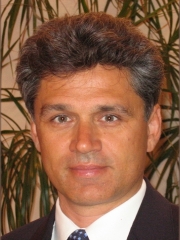CS Colloquium Series @ UCY
Department of Computer Science - University of Cyprus
The Department of Computer Science at the University of Cyprus holds research colloquiums and social hours approximately once weekly. All university students, faculty, and staff are invited to attend. Notifications about new and upcoming events are automatically disseminated to a variety of institutional lists.
If you don't receive these notifications, but want to get informed about upcoming colloquium announcements, you can do the following:
Colloquium Coordinator: Demetris Zeinalipour
Colloquium: Brain-inspired computing for machine vision, Prof. Nicolai Petkov (University of Groningen, Netherlands), Wednesday, May 23, 2012, 11.00-12:00 EET.
The Department of Computer Science at the University of Cyprus cordially invites you to the Colloquium entitled:
Brain-inspired computing for machine vision
 |
Speaker: Prof. Nicolai Petkov |
Abstract:
Background: Insights into the function of the visual system of the brain can provide clues for solving computer vision tasks. For instance, the popular Gabor filter was inspired by the function of orientation-selective neurons in areas V1 and V2 of visual cortex. Information about the function of further cortical areas, such as V4 and TEO, has not been sufficiently used yet in computer vision.
Methods: We propose a novel keypoint detector that is inspired by the properties of shape-selective neurons in area V4 of visual cortex. It is trainable as it is configured by the automatic analysis of a feature specified by a user. We configure a set of detectors that are selective for vascular bifurcations in retinal fundus images and demonstrate how such filters can be used to detect similar features. The automatic configuration of such an operator selects given channels of a bank of Gabor filters and the response of the proposed filter is computed as the product of their responses at specific locations. The proposed operator can be implemented easily using convolutions, shifting, blurring and pixel-wise function evaluation. We refer to it as COSFIRE - Combination of Shifted Filter Responses.
Results: With the proposed operators, we achieve a recall rate of 98.52% and a precision rate of 95.19% on a set of 40 binary fundus images from the DRIVE data set containing more than 5000 bifurcations and cross-overs. The SIFT approach achieves a recall rate of 82.04% and a precision rate of 51.87%. We applied the proposed operators to the recognition of handwritten digits and achieved results (of 99.45% correct recognition) near the best ever achieved results on the complete MNIST dataset. We also use the proposed operator for traffic sign recognition and achieve recognition rate of 100%.
Conclusions: The proposed filters are effective in the detection of vascular bifurcations in retinal fundus images and in the recognition of handwritten digits . They are versatile keypoint detectors as they can be configured with any given local contour pattern and are subsequently able to detect the same and similar patterns.
Short Bio:
Nicolai Petkov is professor of computer science at the University of Groningen since 1991. In the period 1998-2009 he was scientific director of the Institute for Mathematics and Computer Science. He works in the field of brain-inspired visual pattern recognition.
Sponsor: The CS Colloquium Series is supported by a generous donation from  |